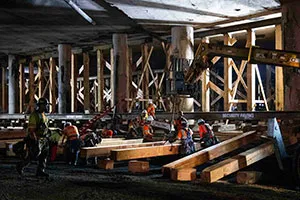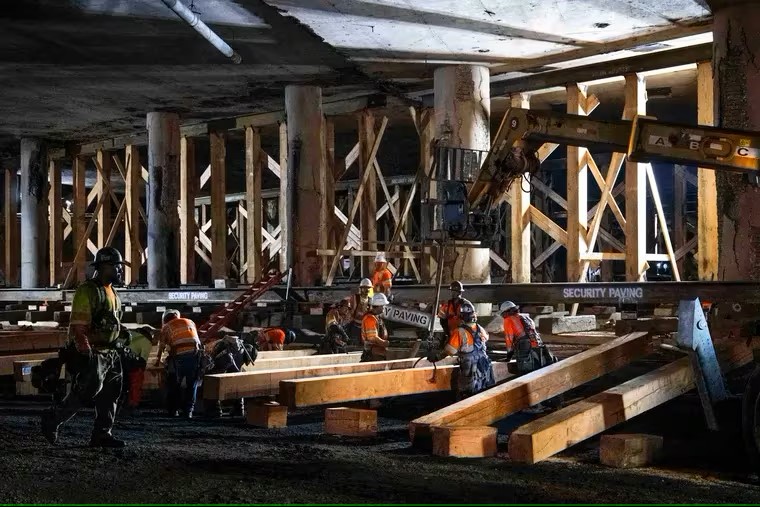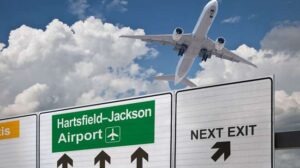$3 Million in Emergency Federal Funding Helps to Get Traffic Flowing Again
Stay on top of Logistics News: Get KGR News in your Inbox
Hard work by first responders, skilled workers and engineers, and an infusion of $3 million of federal emergency funding led to the early reopening of a stretch of Interstate 10 through downtown Los Angeles on Nov. 19.
The road had been shut for eight days when an overpass collapsed due to a fire. The Nov. 11 blaze, believed to be the work of an arsonist, remains under investigation.
Early on, officials said it would take three to five weeks to make the repairs to reopen the major artery that is estimated to carry 300,000 vehicles a day, including roughly 13,000 trucks, according to the Federal Highway Administration.
However, it only took eight days to repair the damage, and officials said traffic is now flowing on five lanes on I-10 in each direction between Alameda Street and the East Los Angeles interchange in time for the Thanksgiving holiday, reducing the disruption to Los Angeles commuters.
David Heller, senior vice president of safety and government affairs for the Truckload Carriers Association, said the group had not heard of any serious delays from members.

Construction crews shore up the fire-damaged I-10 in Los Angeles on Nov. 16. (Sarah Reingewirtz/The Orange County Register via AP)
Almost immediately after the fire, fed by flammable materials stored under the roadway, Democratic California Gov. Gavin Newsom declared the collapse of the wood supports and bridge deck near downtown a state of emergency, making it easier for Caltrans to seek federal assistance funding.
Newsom said at a Nov. 15 news conference that economic damages of the I-10 shutdown would be greater than those during the 1994 earthquake in Northridge, Calif.
“300,000-plus vehicles go through this corridor every single day,” Newsom said. “It’s of significant consequence to the economy, and to the health and safety of Angelenos.”
Fortunately, on Nov. 15, the U.S. Department of Transportation’s FHWA announced the immediate availability of $3 million in “quick release” Emergency Relief funds for use by Caltrans to offset costs of emergency repair work on I-10 due to the fire damages that resulted in a closure of the interstate in both directions.
“This segment of I-10 is a vital corridor in our interstate highway system, and it’s important to hundreds of thousands of commuters as well as to America’s supply chains that it be quickly repaired,” said U.S. Transportation Secretary Pete Buttigieg. “These federal emergency funds will help California launch this urgent repair work, and the Biden-Harris administration stands ready to provide further resources as necessary to address this issue quickly and safely.”
“We know the I-10 corridor is a critical connection for both people and goods traveling in and around Los Angeles,” said FHWA Administrator Shailen Bhatt. “The quick release funding we’re providing Caltrans is the first of many steps we are taking to help California get this key route open as soon as possible for the workers, residents and businesses that rely on this route every day.”
“The 10 will be safe to drive on weeks ahead of schedule because of urgent action and collaboration at all levels of government,” said Los Angeles Mayor Karen Bass. “When we work together, nothing can stop Los Angeles. Right when this happened, I heard from our state and federal partners that they would let nothing stand in our way.
“The White House and the Governor’s Office not only lived up to that promise, they helped us exceed all expectations. Today is proof of locking arms delivering real results for the people of this city.”
“The work that happened here is extraordinary,” Vice President Kamala Harris said during a visit to the scene on Nov. 19. “It was possible with the will and ambition of the workers on the ground, and their commitment as public servants and as union members to get this done and deliver for the people of Los Angeles. This is the kind of work that is happening around the country — where hard-working men and women, carpenters, laborers, and government workers, are rebuilding America’s infrastructure.”




Your article helped me a lot, is there any more related content? Thanks!
Your point of view caught my eye and was very interesting. Thanks. I have a question for you.
Thanks for sharing. I read many of your blog posts, cool, your blog is very good.
Can you be more specific about the content of your article? After reading it, I still have some doubts. Hope you can help me.
Can you be more specific about the content of your article? After reading it, I still have some doubts. Hope you can help me.
Thanks for sharing. I read many of your blog posts, cool, your blog is very good. https://www.binance.com/si-LK/register?ref=V2H9AFPY
Thanks for sharing. I read many of your blog posts, cool, your blog is very good.
Your article helped me a lot, is there any more related content? Thanks! https://www.binance.com/pt-PT/join?ref=DB40ITMB
Your article helped me a lot, is there any more related content? Thanks! Meilleur code de parrainage Binance
I don’t think the title of your article matches the content lol. Just kidding, mainly because I had some doubts after reading the article.
Your point of view caught my eye and was very interesting. Thanks. I have a question for you. Register
Your article helped me a lot, is there any more related content? Thanks!
Thank you for your sharing. I am worried that I lack creative ideas. It is your article that makes me full of hope. Thank you. But, I have a question, can you help me?
**mindvault**
mindvault is a premium cognitive support formula created for adults 45+. It’s thoughtfully designed to help maintain clear thinking
**mind vault**
mind vault is a premium cognitive support formula created for adults 45+. It’s thoughtfully designed to help maintain clear thinking
**prostadine**
prostadine is a next-generation prostate support formula designed to help maintain, restore, and enhance optimal male prostate performance.
Thanks for sharing. I read many of your blog posts, cool, your blog is very good.
**gl pro**
gl pro is a natural dietary supplement designed to promote balanced blood sugar levels and curb sugar cravings.
**mitolyn**
mitolyn a nature-inspired supplement crafted to elevate metabolic activity and support sustainable weight management.
**zencortex**
zencortex contains only the natural ingredients that are effective in supporting incredible hearing naturally.
**prodentim**
prodentim an advanced probiotic formulation designed to support exceptional oral hygiene while fortifying teeth and gums.
**vittaburn**
vittaburn is a liquid dietary supplement formulated to support healthy weight reduction by increasing metabolic rate, reducing hunger, and promoting fat loss.
**yusleep**
yusleep is a gentle, nano-enhanced nightly blend designed to help you drift off quickly, stay asleep longer, and wake feeling clear.
**synaptigen**
synaptigen is a next-generation brain support supplement that blends natural nootropics, adaptogens
**nitric boost**
nitric boost is a dietary formula crafted to enhance vitality and promote overall well-being.
**glucore**
glucore is a nutritional supplement that is given to patients daily to assist in maintaining healthy blood sugar and metabolic rates.
**wildgut**
wildgutis a precision-crafted nutritional blend designed to nurture your dog’s digestive tract.
**pinealxt**
pinealxt is a revolutionary supplement that promotes proper pineal gland function and energy levels to support healthy body function.
**energeia**
energeia is the first and only recipe that targets the root cause of stubborn belly fat and Deadly visceral fat.
**boostaro**
boostaro is a specially crafted dietary supplement for men who want to elevate their overall health and vitality.
**prostabliss**
prostabliss is a carefully developed dietary formula aimed at nurturing prostate vitality and improving urinary comfort.
**breathe**
breathe is a plant-powered tincture crafted to promote lung performance and enhance your breathing quality.
**potentstream**
potentstream is engineered to promote prostate well-being by counteracting the residue that can build up from hard-water minerals within the urinary tract.
**hepato burn**
hepato burn is a premium nutritional formula designed to enhance liver function, boost metabolism, and support natural fat breakdown.
**hepatoburn**
hepatoburn is a potent, plant-based formula created to promote optimal liver performance and naturally stimulate fat-burning mechanisms.
**cellufend**
cellufend is a natural supplement developed to support balanced blood sugar levels through a blend of botanical extracts and essential nutrients.
**prodentim**
prodentim is a forward-thinking oral wellness blend crafted to nurture and maintain a balanced mouth microbiome.
**flow force max**
flow force max delivers a forward-thinking, plant-focused way to support prostate health—while also helping maintain everyday energy, libido, and overall vitality.
**revitag**
revitag is a daily skin-support formula created to promote a healthy complexion and visibly diminish the appearance of skin tags.
**sleeplean**
sleeplean is a US-trusted, naturally focused nighttime support formula that helps your body burn fat while you rest.
**memorylift**
memorylift is an innovative dietary formula designed to naturally nurture brain wellness and sharpen cognitive performance.
Can you be more specific about the content of your article? After reading it, I still have some doubts. Hope you can help me. https://accounts.binance.com/register?ref=P9L9FQKY
Thanks for sharing. I read many of your blog posts, cool, your blog is very good. https://www.binance.com/en-IN/register?ref=UM6SMJM3
Indulge in JuccyPod M5 Flavors for smooth, flavorful vaping. Each puff offers vibrant taste, creamy vapor, and lasting enjoyment.
Thank you for your sharing. I am worried that I lack creative ideas. It is your article that makes me full of hope. Thank you. But, I have a question, can you help me?
Hey, I’ve been checking out df99 and it seems pretty legit! Anyone else tried their platform? Thinking of throwing a few bucks I have online at df99 and see what’s up.
Been playing on PH889B for a bit now. Decent platform, worth checking out for a variety of games. ph889b
Nutzen Sie deshalb unsere kostenlose Erstberatung, um nicht leichtfertig Ansprüche wegen der Verjährung zu.
Nach spätestens 10 Jahren verfallen aber jegliche Ansprüche.
Ob und wann Sie in diesem Fall davon Kenntnis erlangen, dass
das Online-Casino-Angebot illegal war, ist hier egal.
Da die Anbieter lange Zeit entgegen besseren Wissens mit
der eigenen Legalität geworben haben, ist das für Sie ein Glücksfall.
Allerdings beginnt diese am Zeitpunkt, an dem Sie
davon Kenntnis erlangen, dass das Online-Casino illegal war.
2025 könnten nämlich vereinzelt Ansprüche mit 3-jähriger Verjährungsfrist bereits verfallen sein.
Auch Banken oder Zahlungsdienstleister wie PayPal können sich durch die Mitbeteiligung an illegalem Glücksspiel
haftbar machen, wenn sie entsprechende Zahlungen durchgehen lassen. Sie müssen vor
Gericht nämlich glaubhaft versichern können, dass
Sie zu keiner Zeit Bescheid wussten, dass Sie an illegalem
Glücksspiel teilnehmen. Stattdessen müssen Sie aktiv
werden und eine Klage einreichen, in der Sie durch Online-Glücksspiel verlorenes Geld zurückfordern. Hier wurden bereits seit 2012 eigenständig Lizenzen an Glücksspielanbieter verteilt, wodurch die Angebote innerhalb des Bundeslandes gültig waren. Juni 2021 war
jegliches Glücksspiel in Deutschland illegal. Für zahlreiche Menschen bedeutete das immense Geldverluste und hohe
Spielschulden.
References:
https://online-spielhallen.de/der-legiano-casino-login-ihr-weg-zum-online-glucksspiel/
Spieler mit Sitz in Österreich und der Schweiz sind von den deutschen Lizenzauflagen nicht betroffen. Juli 2021 in Kraft getretene neue Glücksspielstaatsvertrag
legalisiert das Glücksspiel für alle Online-Casinos mit einer deutschen Lizenz.
Highroller spielen gern mit sehr hohen Einsätzen und werden deshalb von Online-Casinos
auch VIPs genannt. Schließlich ist das Spielen mit Echtgeld in deutschen Online-Casinos der Hauptgrund für den Besuch einer Internet-Spielbank.
Wir möchten unsere Leser beim Finden der besten Seiten im deutschen Sprachraum mit Hinblick auf die jeweiligen Bedürfnisse unterstützen.
Diese mobile Flexibilität macht das Spielen noch angenehmer und sorgt dafür,
dass Sie Ihre Lieblingsspiele immer und überall genießen können. Rakoo Casino bietet eine
Vielzahl von Zahlungsmethoden, darunter PayPal und paysafecard, um den Spielern eine sichere Einzahlung zu ermöglichen. Diese hohen Quoten bieten den Spielern bessere Gewinnchancen und machen das Spielen noch attraktiver.
Es gibt spezielle Bonusaktionen, die regelmäßig angeboten werden und
den Spielern zusätzliche Gewinnchancen bieten.
Durch die Auswahl eines Casinos mit einer
gültigen Lizenz, lokale Zahlungsmethoden und Kundendienst auf Deutsch bietet Sie, wenn Sie diese Schritte ausführen, ein erstklassiges Glücksspielerlebnis.
Mehrere Faktoren tragen dazu bei, ein Online Casino für deutsche Spieler geeignet
zu machen, einschließlich der Einhaltung lokaler Vorschriften, Lizenzierung,
Zahlungsmethoden, deutschland lizenzierten Spielanbietern und
der Verfügbarkeit des deutschsprachigen Kundendienstes.
Die strenge Glücksspielvorschriften der deutschen Regierung stellen sicher,
dass nur lizenzierte Unternehmen ihre Dienste den Spielern in Deutschland anbieten können.
References:
https://online-spielhallen.de/wazamba-casino-aktionscodes-ihr-schlussel-zu-aufregenden-boni/
Your point of view caught my eye and was very interesting. Thanks. I have a question for you. https://www.binance.info/ro/register?ref=HX1JLA6Z
https://t.me/kazino_s_minimalnym_depozitom/36
https://t.me/kazino_s_minimalnym_depozitom/38
https://t.me/it_martin_cASiNO
Every online casino Australia players can enjoy has a unique bonus structure.
Many Aussie online casinos host real-time
tournaments and leaderboard events. The best PayID online casinos offer instant payments.
Most games offer high RTPs, and some bonuses can give your bankroll a nice boost if you’re looking to up the stakes.
SlotsGem closely follows most other casinos, running a comparable, high-quality game lobby with over 7,000 titles – including more than 6,000 pokies and over 400 live dealer roulette, baccarat, poker, and blackjack tables.
Lucky Vibe offers an impressive selection with over 5,000 pokies and more
than 400 live dealer games, all optimised for mobile on iOS and Android.
References:
https://blackcoin.co/holdem-headsup-on-fifth-street/
This means Crown is your one-stop destination for fun,
gaming, and enjoyable dining. This renowned venue is Crown Casino’s multi-layered auditorium, with a
seating capacity of 800 over patrons. The large casino and entertainment arena is home to some of the
best casino games; such as blackjack, poker, roulette and other casino favourites.
With up to a 5TB capacity, reasonably fast sequential read speed, and a very fast copy-to-drive speed, the RGB accent lighting with Razer Chroma support is really just an added bonus.
While it does have several much smaller capacities starting at 250GB, the utility of such small capacities
on an external HDD makes them harder to recommend, especially when you can get a
faster portable SSD with the same or greater capacity for not a whole lot more
money. As our component lead, he is responsible for testing any and all components
that hit the market, including GPUs, CPUs, storage drives, and more.
We found transfer speeds to be relatively quick, the design to be durable, and
with storage ranging from 1TB to 6TB, it’s great for documents, video and image files, and data back-up.
You’ll know this is the case if your computer displays a prompt asking you to format the external
hard drive. Also, you may need to reformat an external hard drive if
it gets damaged or corrupted, and your computer can no
longer recognise the hard drive. In terms of external HDDs, the Seagate Expansion is
my top pick thanks to its huge capacity options and incredibly fast
read, write, and copy speeds for a hard disk drive.
References:
https://blackcoin.co/speedau-casino-your-gateway-to-real-money-gaming/
Apart from the welcome bonus you get after signing
up on our platform, we always have something for every player
subsequently. Get your RollXO casino login, and
we’ll grant you access to our automatic VIP program that rewards players with up to AU$45,000 + 1,500 free spins.
It’s not a secret that you have to verify your account after Roll XO casino
login to start playing for real money. Moreover, we provide great deposit and withdrawal options, including cryptocurrency, which is an important factor for
many players.
Please know that our bonus rules exist to protect players and keep
the gaming environment fair, and we regret that this situation caused you frustration. My experience with ROLLXO has been really
good, the layout and variety of games is awesome 👌🏽 I have been playing for a
while now and have enjoyed playing here with some really good
wins. ROLLXO has great bonuses but a pitty that
you’re only able to play certain games when using a bonus.
For those weekend warriors, RollXO also provides unlimited 50 free
spin bonuses on any Saturday deposit made with the code XOXO.
The platform offers cooling-off periods up to six months and self-exclusion options with a minimum period
of six months. Players can set personal limits on deposits, losses, wagers, and gaming sessions directly from their account settings.
References:
https://blackcoin.co/speedau-casino-your-gateway-to-real-money-gaming/
You want to upload high-quality, crisp, and creative pictures in order to get your
items sold. Some customers would prefer to pay slightly
more money to purchase items but instead, have that item
shipped for free. A mistake that new online sellers make
is weighing the item before they’ve packaged it, only to
be on the hook for the extra shipping costs to cover the additional weight of the box and padding.
Five business days after the tracking information updates to “delivered,” your earnings
will be released from Facebook marketplace.
Additionally, regular audits by independent firms ensure the fairness and integrity of the gaming
operations. It partners with leading gaming software
providers to offer a diverse portfolio of games, ensuring high-quality graphics, sound, and reliability.
For those who prefer direct banking transactions, bank transfers
and services like POLi for Australian users are available,
though these may take longer to process. E-wallets like PayPal, Skrill, and Neteller provide another layer of security and anonymity,
also ensuring quick transaction times.
References:
https://blackcoin.co/a-big-candy-casino-au-real-money-pokies-fast-payouts-in-au/
gamble online with paypal
References:
http://www.career4.co.kr/bbs/board.php?bo_table=ci_consulting&wr_id=351514
online pokies australia paypal
References:
https://petalconnect.org/employer/paypal-casino-tout-savoir-sur-ce-moyen-de-paiement-en-2025/
online casino mit paypal
References:
https://imgo.cc/pearlene539694
online casino paypal
References:
https://allasguru.com/cegek/best-paypal-online-casinos-real-money-deposits-withdrawals-al-com/
paypal casino usa
References:
https://spandexjobs.com/employer/50-free-chip-no-deposit-sign-up-bonus-australia/
Big fan of ‘gà chọi c1’ here! Hoping to find some good matches on this site. Check out gà chọi c1.
Risk management is key in online gaming, and platforms like bet99 app slot download seem to prioritize education – a smart move for new players! Understanding game mechanics & responsible play is crucial for long-term enjoyment & minimizing potential losses. It’s good to see platforms focusing on that aspect.
Hey, guys! Thinking of exploring places. Any insights on 90jililogin? Have you played it before? Any specific advice or tips you can pass along?
Just installed the zo88app. Looks promising, will update the review once I play sometime! So far it is a good app. zo88app
Your article helped me a lot, is there any more related content? Thanks! https://www.binance.com/register?ref=IXBIAFVY
Comment: This remarkable 8-day I-10 repair showcases project management excellence. Emergency coordination + skilled teams = 21-day savings. Similar precision drives jilliqq apk platform reliability under high-traffic conditions. Great teamwork!
I don’t think the title of your article matches the content lol. Just kidding, mainly because I had some doubts after reading the article.
多瑙高清完整版智能AI观看体验优化,海外华人可免费观看最新热播剧集。
Yo, I’ve tried everything, and some are good, some are bad, but winwinbetpk? It’s alright. I had a pretty good experience. You can check it out for yourself at winwinbetpk.
Getting into KG777 was quick and painless with kg777login. No weird hoops to jump through, just smooth sailing. The games inside are legit, and there’s a good mix of stuff. Check out kg777login if you’re looking to sign up.
KG777 ah? Heard some good things about them. Got quite a few games one. Maybe can try your luck there. See what they got at kg777!
Your point of view caught my eye and was very interesting. Thanks. I have a question for you.